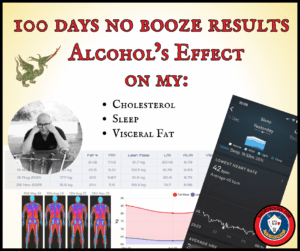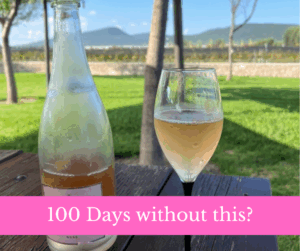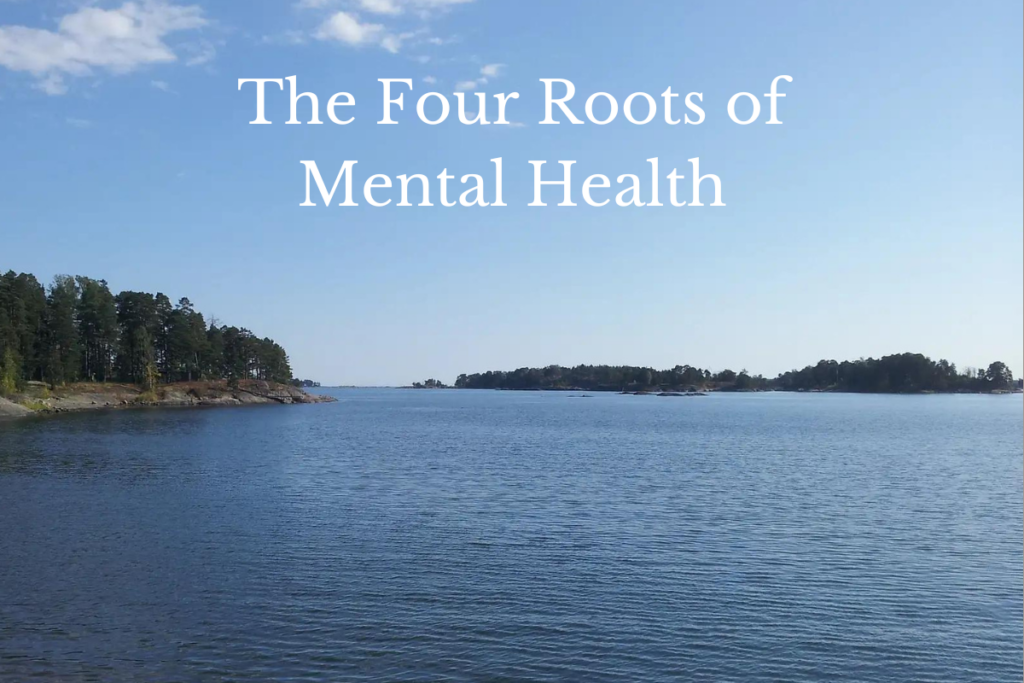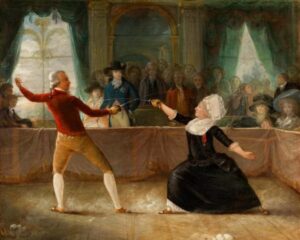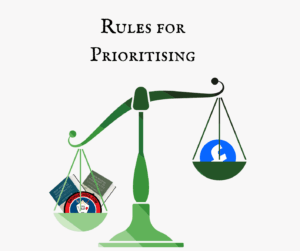I stopped drinking alcohol on August 19th, aiming for 100 days. In the end, I reached 103 days without booze, and without much effort. This post unpacks my 100 days no booze results, including cholesterol, visceral fat, sleep, heart rate, and the strange mysteries of my DEXA scans.
If you want the background and the halfway-point update, you can read that here — but let’s jump into the results.
Table of Contents
ToggleWeight and Waist: The Simple Home Measurements
So what happened?The only measurements I can reasonably make at home are overall weight and waist circumference. Those have both improved.
- Weight: 81.2kg → 78.7kg
- Waist: 91cm → 88cm
Not bad results, but not stellar. I did once lose 10kg in three weeks…
Two noticeable effects:
•Reflux definitely improved
•Sleep did not noticeably improve
But the most important finding wasn’t from any measurement device:
My wife and daughters all agreed I was much less irritable when not drinking.
That’s definitive.
The two main metrics I was trying to improve were cholesterol levels, and visceral fat. I was hoping for improved sleep and thus more creative juice too.
Cholesterol and Triglycerides
Let’s start with cholesterol. Here are the results over the last year:
Back on 31 March, my triglycerides were so high the lab couldn’t even calculate LDL. After just three weeks without alcohol, everything had improved dramatically by 22 April.
The 100 Days No Booze Results
After the full 100 days:
•LDL: down from 4.12 → 3.53
•Triglycerides: up slightly from 1.24 → 1.57, but still well within reference range
These numbers fluctuate, and any single blood test is just a snapshot — like a photo of a busy street rather than a full documentary. But overall:
The trend is clear: not drinking alcohol helps my cholesterol and triglycerides.
These things are not an exact science: there are too many variables affecting cholesterol levels on any given day. Any blood test is a snapshot of a moment in time, like a photograph of a busy street. But the trend seems positive. From a cholesterol and triglycerides perspective, it’s clear that cutting out alcohol helps me a lot.
A Coffee Cholesterol Surprise
Two weeks before the final blood test, I learned that diterpenes in unfiltered coffee can raise cholesterol. Since then I’ve switched to paper-filtered coffee. This may have helped too.
Visceral Fat: The Most Interesting (and Confusing) Results
Now the visceral fat. It was baffling to me that at my previous DEXA scan in August, my overall body fat was down quite a bit, but my visceral fat had jumped back up from 115 to 136. This latest scan, on November 28th, was even weirder. According to the weighing scales at the DEXA clinic, I’d lost a total of 1.8kg exactly.
My visceral fat is down to 103 cm2. (Visceral fat is measure in cm2 because it’s a calculation of the area of the cross-section of your torso at the navel. So if you cut me in half with a very sharp sword at my navel and measured the total area of fat, it would be 103cm2 out of a total of about 730)
Here's the pdf of the entire scan results: Guy_Windsor_2025-11-28-report
This is excellent, and what I was hoping. But here’s the thing. A bottle of wine is about 700 calories. I was averaging a bottle a day. So over 100 days, my overall calorific intake was down by about 70,000 calories (not counting the extra food I would have also eaten, because drinking with food tends to increase how much you eat). Fat stores about 9000 calories per kilo, so that’s about 7.8kg of fat.
But I’d lost a total of 785g. What the actual? That’s maybe 10% of what one might reasonably expect.
The rest of my weight loss came from “lean tissue”, mostly in the torso. 1.929kg from my trunk to be exact. That’s obviously not muscle (or at least mostly not muscle). There simply isn’t that much muscle to lose- and I’m stronger now than I was in August, including in my so-called “core”. So that’s either fluid, or organ mass, with perhaps some of it being gut contents (though my bowels were fine both that day and for the previous scan).
I also don’t understand how I can be 1.8kg lighter, having lost 2.631kg of lean mass and 785g of fat. That’s a total of 3.416kg… so where’s the extra 1.616kg? I certainly haven’t added that much to my bones! And I wasn’t bloated during the previous scan.
This was baffling enough that I contacted the company, and after a bit of email back and forth got on a call with one of their technicians. He pointed out that in my previous scans the DEXA total mass measurement agreed quite closely with the impedance scale measurement, except for my August 2025 scan, where it disagrees by just over 2kg. The simplest explanation is that the technician on the day recorded my weight wrong: he put 80.6kg in when it should have been closer to 82 (the DEXA recorded it at 82.298).
It’s normal for the DEXA scan to calculate total body mass about 2-400 grammes higher than the scale weight. But not 1.7kg high. And that 1.7kg is very close to the 1.6kg discrepancy in these figures. So if we correct that weight measurement, the numbers basically add up.
Here’s another mystery. According to the scan, I’ve gained 98g of lean mass (probably muscle) in my right leg… but lost 718g from my left leg! Without any noticeable change in relative strength (and yes, I am right handed and footed, but I do all my training on both sides, and in August, they were basically equal).
So, getting back to the actual point of the scan: it does seem that cutting alcohol cuts my visceral fat, but does nothing at all for my other fat. And it’s somehow fucked my left leg, even though it feels fine.
That was Friday, day 102 of my 100 days. So I had a small glass of wine that evening, and a few more on Saturday (my wife’s birthday), and a lot more on Sunday (my birthday). My reflux did not approve, but it was worth it.
Alcohol vs. Heart Rate: Oura Ring Data
Leaping down off the wagon like that gave me an opportunity to double check alcohol’s effect on sleep, so just for fun I put on my Oura ring and measured my heart rate. If you’re familiar with my Oura woes, I don’t take anything it measures seriously except heart rate, temperature, and HRV. It certainly can’t tell the difference between me lying in bed trying to sleep and me actually sleeping. But I do think it measures heart rate pretty well.
Here’s what the graphs look like. In each case I went to bed sober, and stopped drinking by 7pm, four hours before lights out.
Sunday:
So whether I actually feel better or not, it’s really obvious that my heart prefers me to not drink at all. I mean, average HR 45, lowest 42, that’s pretty decent. Generally speaking, any night when I haven’t drunk any alcohol, it’ll average something below 50, and get down to 45 or below.
Just for fun: here’s what it looked like after I got accidentally shitfaced at my friend’s party. Last booze in about 4pm, I think.
What 100 Days Without Alcohol Really Changed
Putting aside the data inconsistencies, the genuine results are:
Positive effects
- Major improvement in visceral fat
- Lower LDL cholesterol
- Overall waist reduction
- Less irritability (confirmed by independent household authorities)
- Significantly lower resting heart rate on sober nights
Little or no effect
- Sleep quality (subjective)
- Subcutaneous fat
Negative effects:
- None.
So what am I going to actually do now?
I’d like to get my body fat percentage below 18. Here’s how I’ll approximate that:
1. Waist measurement down from 88 to 86cm.
2. Weight down from ~79kg to ~76kg.
Approach:
1. Restrict booze. Generally speaking, no drinking unless it’s a special occasion. Tuesday is not a special occasion.
2. Go slow-carb. It worked very well for me before, let’s try it again. Being careful to maintain protein intake, and continue with weight training, to preserve muscle mass.
3. Cycle on and off, cutting weight (which gets rid of fat and a bit of muscle), and bulking up (which adds muscle and a bit of fat).
4. Fast occasionally. I normally have about 15 hours between last calorie in at night and first in the morning anyway (just because it’s more comfortable for me). Increasing the fasting time to 18 hours is not hard, so I’ll think about doing that more often, with an occasional 24 hour fast, or even longer. I train too much to want to fast too often- I’m concerned about losing muscle mass.
4. Track weight, waist, and strength. If my waist is down and my strength is up, I’ll call that a success, whatever the scales or DEXA says.
December is not the month for this, so I’ll play around with various things as convenient, and get consistent and serious about it on January 2nd. Another 100 days no booze, with a strict slow-carb diet (no starch, no sugar, lots of veg and protein), will take us to April 12th. I will probably make exceptions to the no-booze thing, but only for very special occasions. There is a world of difference between two glasses of wine in a fancy restaurant every couple of months, and two glasses of wine before dinner every evening.
Final Thoughts on 100 Days No Booze Results
The headline takeaway is simple: Alcohol has a strong negative effect on my visceral fat, cholesterol, irritability, and sleeping heart rate.
It doesn’t magically melt fat off me, but it clearly improves a bunch of meaningful health indicators.
The basic idea behind all of my training and health related activities is this:
Find out what works for you, then do that.
Both of those components are hard. Healthcare professionals can tell you what the current-ish state of the science suggests should work for most people most of the time, but they aren't much good at targeting what works for you specifically. The only way to know what works for you is to try it, and track the results.
Then, having discovered that doughnuts make you fat, or alcohol is bad for you, or whatever it is, you have to figure out how to incorporate that insight into your daily life. That can be simple and easy, or it can be really hard, especially when it involves going against mainstream cultural expectations. Even if the intervention is simple, it may not be easy. I'm lucky in that this one was both simple and quite easy, but many others I've tried are a lot harder.
My book The Principles and Practices of Solo Training covers this approach in depth and detail. If you've enjoyed these alcohol posts, you'll probably enjoy that book. And we have a sale on until the end of the year: use the code GUYSBIRTHDAY25 for 25% off any digital product, and BIRTHDAYPRINT10 for 10% off any print product, at swordschool.shop.
I share this kind of thing on my newsletter quite often, so sign up below to stay informed.

